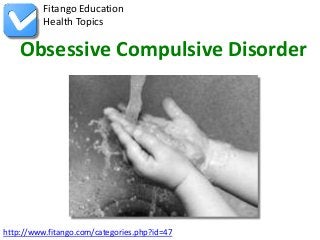
Obsessive Compulsive Disorder
- 1. Fitango Education Health Topics Obsessive Compulsive Disorder http://www.fitango.com/categories.php?id=47
- 2. Overview Obsessive-compulsive disorder (OCD) is a type of anxiety disorder. If you have OCD, you have repeated, upsetting thoughts called obsessions. You do the same thing over and over again to try to make the thoughts go away. Those repeated actions are called compulsions. http://www.fitango.com/categories.php?id=47 1
- 3. Overview Examples of obsessions are a fear of germs or a fear of being hurt. Compulsions include washing your hands, counting, checking on things or cleaning. Untreated, OCD can take over your life. http://www.fitango.com/categories.php?id=47 2
- 4. Symptoms People with OCD generally: -- Have repeated thoughts or images about many different things, such as fear of germs, dirt, or intruders; acts of violence; hurting loved ones; sexual acts; conflicts with religious beliefs; or being overly tidy http://www.fitango.com/categories.php?id=47 3
- 5. Symptoms -- Do the same rituals over and over such as washing hands, locking and unlocking doors, counting, keeping unneeded items, or repeating the same steps again and again -- Can't control the unwanted thoughts and behaviors -- Don't get pleasure when performing the behaviors or rituals, but get brief relief from the anxiety the thoughts cause http://www.fitango.com/categories.php?id=47 4
- 6. Symptoms -- Spend at least 1 hour a day on the thoughts and rituals, which cause distress and get in the way of daily life. http://www.fitango.com/categories.php?id=47 5
- 7. Treatment First, talk to your doctor about your symptoms. Your doctor should do an exam to make sure that another physical problem isn't causing the symptoms. The doctor may refer you to a mental health specialist. OCD is generally treated with psychotherapy, medication, or both. http://www.fitango.com/categories.php?id=47 6
- 8. Treatment **Psychotherapy** A type of psychotherapy called cognitive behavior therapy is especially useful for treating OCD. It teaches a person different ways of thinking, behaving, and reacting to situations that help him or her feel less anxious or fearful without having obsessive thoughts or acting compulsively. One type of therapy called exposure and response prevention is especially helpful in reducing compulsive behaviors in OCD. http://www.fitango.com/categories.php?id=47 7
- 9. Treatment **Medication ** Doctors also may prescribe medication to help treat OCD. The most commonly prescribed medications for OCD are anti-anxiety medications and antidepressants. Anti-anxiety medications are powerful and there are different types. Many types begin working right away, but they generally should not be taken for long periods. http://www.fitango.com/categories.php?id=47 8
- 10. Treatment **Medication ** Antidepressants are used to treat depression, but they are also particularly helpful for OCD, probably more so than anti-anxiety medications. They may take several weeks—10 to 12 weeks for some—to start working. Some of these medications may cause side effects such as headache, nausea, or difficulty sleeping. These side effects are usually not a problem for most people, especially if the dose starts off low and is increased slowly over time. Talk to your doctor about any side effects you may http://www.fitango.com/categories.php?id=47 9
- 11. Treatment **Medication ** It's important to know that although antidepressants can be safe and effective for many people, they may be risky for some, especially children, teens, and young adults. A "black box"— the most serious type of warning that a prescription drug can have—has been added to the labels of antidepressant medications. These labels warn people that antidepressants may cause some people to have suicidal thoughts or make suicide attempts. Anyone taking antidepressants should be monitored closely, especi http://www.fitango.com/categories.php?id=47 10
- 12. Treatment **Medication ** Some people with OCD do better with cognitive behavior therapy, especially exposure and response prevention. Others do better with medication. Still others do best with a combination of the two. Talk with your doctor about the best treatment for you. http://www.fitango.com/categories.php?id=47 11
- 13. Causes OCD sometimes runs in families, but no one knows for sure why some people have it, while others don't. Researchers have found that several parts of the brain are involved in fear and anxiety. By learning more about fear and anxiety in the brain, scientists may be able to create better treatments. Researchers are also looking for ways in which stress and environmental factors may play a role. http://www.fitango.com/categories.php?id=47 12